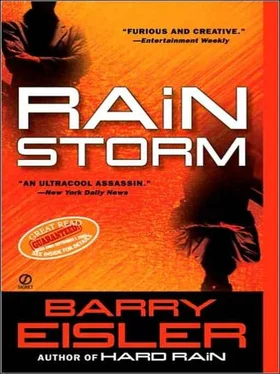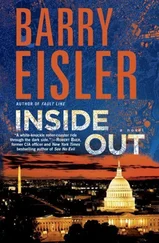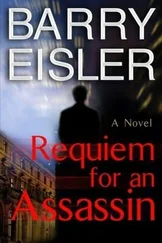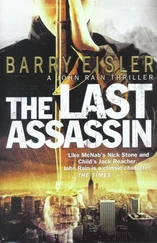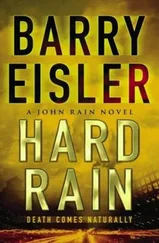After four or five seconds, enough time to ensure that his central nervous system was adequately scrambled, I released the trigger and eased him down to the floor. He was grunting the way someone does when he’s taken a solid shot to the solar plexus. His eyes were blinking rapidly.
I laid the plastic out on the floor and rolled him onto it. I placed his arms at his sides, then I wrapped the plastic around his body and secured it with duct tape, first at wrist level, then the ankles. He started to recover, so I zapped him again with the stun gun. By the time the effects were wearing off for the second time, I had him pretty well mummified in plastic and duct tape. Other than his head and toes, he was immobilized.
I grabbed a pillow off the bed and propped it under the base of his skull so he could see me better. Also so that, if he started thrashing, he wouldn’t bruise the back of his head. My concern had less to do with consideration for him than it did with what might show up in a forensic examination.
I squatted down next to him and watched his eyes. First, they blinked and rolled. Second, they steadied and regained focus. Finally, they bulged in terrified recognition. He tried to move, and, when he found he couldn’t, he began to hyperventilate.
“Calm down,” I said to him, my voice low and reassuring. “I’m not going to hurt you.” Which I supposed was the literal truth, after a fashion.
The hyperventilating went on. “Then… then why have you tied me up?” he panted.
Not an unfair question. I decided to level with him, at least partly. “You’re right,” I told him. “Let me amend what I said. I’m not going to hurt you, if you tell me what I want to know.”
He swallowed hard and nodded. His eyes were still wide with terror, but I could see he was making an effort to pull himself together. “Okay,” he said. “All right.”
I paused to give him a moment to more fully appreciate his new reality. This guy was obviously no hard case. Sure, he was Agency, but the college-boy type, not one of the paramilitaries. The last violence he’d seen firsthand had probably been on the grade-school playground. And now, suddenly, he was tied up and helpless, with a known killer squatting next to him, looking at him like he was a frog about to be dissected. Of course he was terrified. And that was good. If I managed his terror correctly, there was a reasonable chance that he would tell me what I wanted to know.
“Well, Mr. Crawley,” I said, “I guess what we need to talk about is why a nice guy like you would want to have me killed.”
He pursed his lips and swallowed again, his breath whistling in and out of his nose. I could see that he was trying to decide how to handle this. Deny everything? Blame someone else? Confess and beg for mercy? Something in between?
Watching him trying frantically to make up his mind, weighing the pros and cons of the feeble set of options before him, I sensed he understood that I knew what he was thinking, that I had seen it all before and would know just how to handle him regardless of which route he decided to use. So he would probably know enough not to outright deny everything. No, he looked savvy to me, even shrewd. At some level, he was probably thinking, Don’t deny it, he wouldn’t be here if his information weren’t good. And if you don’t deny it, if you confess up to a point, he’ll be more inclined to believe what follows . It would be a variation of the galoshes game I had just played with the old lady with the walker. And he’d probably do a good job, too. A lot of these government guys are pretty adroit when it comes to lying.
Let’s see , I thought, making a mental bet with myself, probably it’ll be something like, “I was only following orders .”
“It’s not me,” he said, unintentionally winning me the bet. “It’s someone else.”
“Who’s that, then?”
“It’s… look, Jesus Christ, I can’t tell you these things!”
“But it’s not you.”
Hope flared in his eyes. “Yes, that’s right.”
I sighed. “Is there another Charles Crawley running around who looks and smells just like you?” I asked.
“What?”
“A twin. You don’t have a twin?”
“What? No, no I don’t.”
“I didn’t think so. But see, that’s strange. Because a guy who looks exactly like you, and also named Crawley, although he called himself Johnson, went to a special operator recently and offered him a hundred thousand dollars to take me out. Went to him personally.”
He glanced to his right, a neurolinguistic sign of imagination, not of recall. He was trying to make something up, to find a way out of the corner he had just painted himself into.
“Maybe, I don’t know,” he said. “Maybe there is someone using my name. Trying to set me up.”
I sighed again. “The operator in question was carrying a cell phone with an integrated digital camera,” I said. “He took about a half dozen pictures of you.”
His pupils dilated. He licked his lips.
“I’m afraid this isn’t going to end the way we were hoping,” I said.
“All right, all right, I’m sorry, I was just afraid. That part was me. But look, I didn’t want to do what I did, I just… I didn’t have a choice.”
“I’m listening.”
He took a deep breath. “You were hired to… to go after someone recently. The problem you have, it’s with that person.”
I shook my head in mild disgust. It’s been my experience that bureaucrats are to killing what the Victorians were to sex: they just can’t bring themselves to call it by name.
I waited, letting the pressure of silence bear down on him. But he stayed cool, resisting the urge to talk. Okay, plan B.
I picked up the stun gun and held it an inch from his eyes, then depressed the trigger. Sharp tendrils of blue electric current crackled between the electrodes, and the acrid smell of ozone cut through the air. He tried to jerk his head away, but there was nowhere for him to go.
I released the trigger. “Remember, Mr. Crawley, my assurance that I wouldn’t hurt you had a condition attached. Let’s not breach the condition, okay?”
The truth was, I didn’t want to hurt him. Fear is a better motivator than pain. Fear is all about anticipation, imagination. Pain is real and quantifiable. Once the pain starts, the person is no longer in fear of it-it’s right there, actually happening. The person might think, okay, this is bad, but I can take it. And he might even be right. So when you’re interrogating someone, once you have to start actually hurting him, you’ve already lost a lot of your leverage. I wanted to avoid all that if I could.
I set the stun gun down. “It’s important that we not hide behind euphemisms and vague references and undefined pronouns, okay?” I said, as though he was a child and I was just explaining the rules of the classroom to him. “It’s important that you tell me exactly who’s coming after me and why. If it turns out that you’re just a bit player in all this, you’ll survive the conversation.”
Now I’d opened a little door of hope for him. All he had to do to march right through it was to betray a few people around him.
Fear of pain, the hope of release. Four out of five interrogators surveyed recommended this combination for…
“Okay,” he said, nodding against the pillow, “okay. If I tell you everything I know about this, will you promise to let me go?”
Denial. A pathetic thing, really. But there are people who need it to get through the tough times. Crawley, it seemed, was one of them.
“Yes,” I said. “But remember, there’s a lot I know already. Otherwise I wouldn’t be here. So I’ll know if you’re leaving something out.”
Читать дальше
